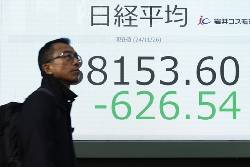TOKYO (AP) — Global shares retreated on Tuesday as worries spread over President-elect Donald Trump's comment that he plans to impose sweeping new tariffs on Mexico, Canada and China as soon as he takes office.
France's CAC 40 declined 0.9% in early trading to 7,195.07, while Germany's DAX slipped 0.6% to 19,288.75. Britain's FTSE 100 shed 0.5% to 8,253.24. The futures for the S&P 500 and Dow Jones Industrial Average were nearly flat.
In Asian trading, Japan's benchmark Nikkei 225 dropped 0.9% to finish at 38,442.00. Australia's S&P/ASX 200 lost 0.7% to 8,359.40. South Korea's Kospi dipped 0.6% to 2,520.36.
Hong Kong's Hang Seng was little changed, inching up less than 0.1% to 19,159.20. The Shanghai Composite fell 0.1% to 3,259.76.
On Monday, stocks rose on Wall Street, led by shares likely to benefit from lower interest rates. The S&P 500 climbed 0.3%. The Dow jumped 1% to a new record. The Nasdaq gained 0.3%.
Treasury yields eased earlier this week in what some analysts called a “Bessent bounce” after Trump said he wants Scott Bessent, a hedge fund manager, to be his Treasury Secretary.
Bessent, a billionaire, has argued for reducing the U.S. government’s deficit, which is how much more it spends than it takes in through taxes and other revenue. Such an approach could soothe worries on Wall Street that Trump’s policies may lead to a much bigger deficit, which in turn would put upward pressure on Treasury yields and drive prices lower.
The Federal Reserve began cutting its main interest rate just a couple months ago from a two-decade high, hoping to keep the job market humming after bringing inflation nearly all the way down to its 2% target.
But immediately after Trump’s victory, traders had reduced bets for how many cuts the Fed may deliver next year. They were worried Trump’s preference for lower tax rates and higher spending on the border would balloon the national debt.
A U.S. report coming on Wednesday could influence how much the Fed may cut rates. Economists expect it to show that an underlying inflation trend the Fed prefers to use accelerated to 2.8% last month from 2.7% in September. Higher inflation would make the Fed more reluctant to cut rates as deeply or as quickly as it would otherwise.
Much focus has been on the resilience of U.S. shoppers, given high prices and still-high interest rates.
In other dealings early Tuesday, benchmark U.S. crude added 45 cents to $69.39 a barrel. Brent crude, the international standard, added 40 cents to $73.88 a barrel.
In currency trading, the U.S. dollar slipped to 154.02 Japanese yen from 154.20 yen. The euro rose to $1.0509 from $1.0495.
...


 Copyright © 1996 - 2024 CoreComm Internet Services, Inc. All Rights Reserved. | View our
Copyright © 1996 - 2024 CoreComm Internet Services, Inc. All Rights Reserved. | View our